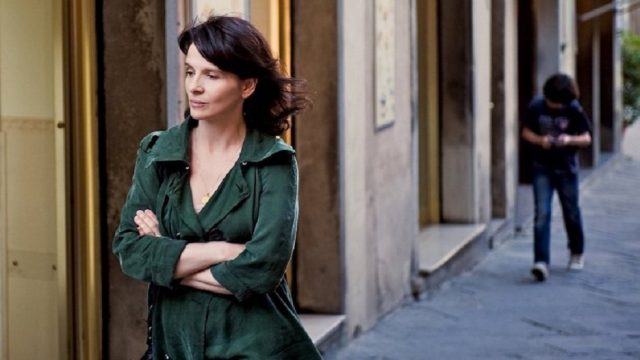Juliette Binoche has a knack for taking us to emotionally-layered places. As Elle, in the opening scenes of Certified Copy, she looks demonstrably pissed off, especially when dealing with her bratty son, yet conveys a heavier sense of disillusionment—demonstrating how different feelings can have an uneasy co-existence. And to get a handle on expressing the subtle differences in feelings (in which Hollywood tends to have a minimal investment), Binoche cues these feelings to crucial demarcations in temporality. Which, as it turns out, is key to the enduring success of this head-trip of a film.
As viewers we are given much to work out on our own. For instance, what does the title have to do with the relationship between James and Elle? James is promoting his book, having the same title as the film, about the value of a copy of an original artwork, and one of his rather unappealing moves is his repeated attempt, when he talks with Elle, to link his book’s theme to what he would insist are larger truths about life and love. Elle’s counterpunching feels intuitively spot-on when dealing with a pill like James. At the same time, some of the beats in the dialogue come across as deliberate cliches, a “copy” of the Hollywood troubled-couple narrative.
To return to the critical issue of temporality, which will greatly distance Certified Copy from the conventions of Hollywood, Binoche’s anger signifies the shorter-term issues in the relationship, centered around James’ book, while her disillusionment suggests longer-term issues related to marriage. That’s absolutely no small matter here, because the film never directly tells us that they are husband and wife. Even when we, presumably, are given enough evidence in the closing moments, our sense of suspended judgment compels us to regard any sense of closure with suspicion.
Indeed the connections between the film’s two halves, which, arguably, are when James and Elle appear more and less ambiguously as husband and wife, are created through our complex observations of past and present. Even when we don’t see “their” son, we can’t help but think of him as being part of their discussions about their marriage, and James’ careerist ambitions seem to have been a problem from the start of their relationship.
Furthermore, Certified Copy invites us to test our imaginations regarding fantasy and alternate realities. In his essay for the 2012 Criterion edition of the film, Godfrey Cheshire asks, “Are these characters playacting in one or the other? Or could it be that the halves are competing falsehoods, or equally true in parallel universes?”
Binoche’s fearless performance and the film’s narrative ambiguity remind me of Gena Rowlands in Love Streams (1980), where we do not find out until much later that Rowlands’s character is the sister of the character played by John Cassavetes. Love Streams was the last film Cassavetes directed. Conversely, Certified Copy was the first film directed by Abbas Kiarostami outside of Iran.
By comparison, Kiarostami goes further out into untested waters than Cassavetes does. While Cassavetes didn’t want to leave any clues in the beginning or middle of Love Streams about the sister-brother relationship that would give viewers an easier time of evaluating the characters, the emotional force of the film’s ending depends upon us having this information. Whereas Certified Copy almost feels more playful if we take James and Elle’s marriage at face value—as they both, at times, appear to do.
Of course, Cassavetes was always against abstraction, and when Rowlands acted in his films, she was sure to have her feet planted in some kind of realist world. But Binoche’s reserves of resentment she fills Elle with have no bottom, and, besides that, James is practically a walking abstraction, perhaps only a flawed copy of the person he wants to be.
Given the intellectual workout we are put through in trying to interpret Certified Copy, it’s tempting to run with the idea that the power of love relies on misrecognition, that love is an illusion that fades when two people see each other as they really are. But this interpretation leads us back almost to where we started, the film as a recitation of one of the most time-worn adages, “love is blind.”
I’d rather arrive at the opposite conclusion. As our surrogate for navigating whatever world the film projects, Binoche has her eyes wide open and never turns away from where love is taking her. What I see as James’ final rejection of Elle, which she has feared all along but refused to stop trying to prevent, discloses a more introspective path: James’ past indiscretions (of which there are probably not a few) suggest his lack of awareness in the present. He’s throwing away a good thing, which he, of course, doesn’t realize he’s doing.
One more possibility for the title. Maybe it’s Kiarostami’s sly admission that he’s made a 21st-century version of a 1970s art film with a heavy ending. Then I’m thinking of what the perfect song would be for the film’s ending. Switch the gender of Neil Young’s “Love in Mind” (1973), and we have the ideal departure music for Binoche’s character:
And I’ve seen love make a fool of a man
He tried to make a loser win
But I’ve got nothing to lose, I can’t get back again

